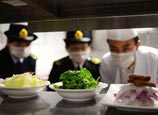
To date, a total of 102 H7N9 cases have been reported in China, including 20 that have ended in death.
GOVERNMENT SUPPORT CRUCIAL
Poultry breeding has been a major sideline and income source for Chinese farmers for centuries. The sluggish demand for these products has led large poultry enterprises to face the risk of capital chain rupture and the much smaller individual raisers to struggle to make ends meet.
"If the market does not recover within a month, the 400,000 ducklings in Longhai City will have to be killed," said Lin Shundong, director of the Longhai Duck Breeding Association.
Lin called for the government to immediately start purchasing poultry products from the non-affected provinces at the price they commanded pre-H7N9, a move that would not only boost market confidence at present, but also stabilize the market in case of a supply shortage when demand revives.
The government should also encourage poultry processing enterprises to purchase, slaughter the poultry, freeze the meat and sell it when conditions recover, Lin urged.
For poultry breeding companies and farmers in the affected areas, the government should subsidize their business, suggested Li Guoxiang, a researcher with the rural development institute under the Chinese Academy of Social Sciences.
"China should set up a systematic rescue mechanism," Li said. "Subsidies and rural insurance could be integrated to tackle the crisis."
So far, the governments of Shanghai and Zhejiang have released policies to support the poultry industry.


















 Teenager saves mom with his bare hands
Teenager saves mom with his bare hands


![]()
